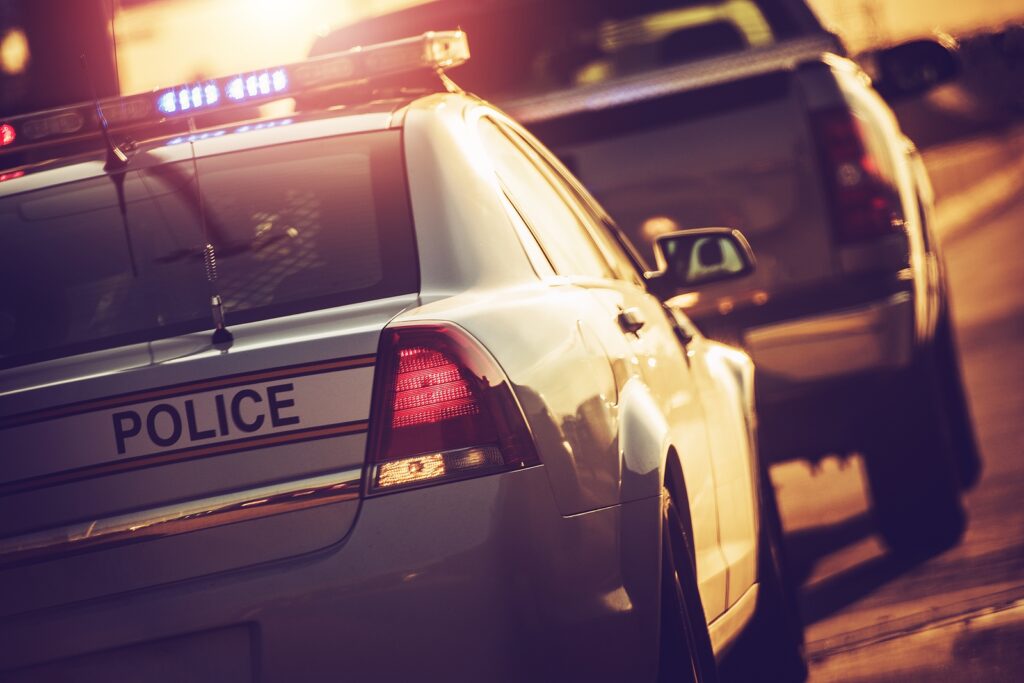Although the facts will differ among all cases of drunk driving arrests, there is a general guideline that police officers use to determine probable cause in a DUI traffic stop. Continue reading to learn what signs and clues law enforcement look for to establish probable cause in a drunk driving arrest and what to do if you were recently charged with a similar offense in Indiana.

Reasonable Suspicion for Traffic Stops
When it comes to DUI traffic stops, it is important to understand the difference between reasonable suspicion and probable cause. In all cases of traffic stops, whether a driver has been drinking alcohol or not, law enforcement must have reasonable suspicion that a driver has committed a traffic violation or infraction before pulling them over. Once pulled over, law enforcement must then establish probable cause to make an arrest.
In order for a police officer to legally arrest a person for a DUI, there must be probable cause, which is evidence that supports an officer’s reasonable belief that a driver is intoxicated, or under the influence of a drug or controlled substance.
Reasons You Might Have Been Pulled Over for Drunk Driving
Both reasonable suspicion and probable cause can be a means to a DUI arrest. Police officers can use either principal, or both, to conduct a legal traffic stop and establish an arrest. The types of probable cause or reasonable suspicions can vary depending on each situation of intoxicated driving. However, these are the top 5 reasons why police officers pull people over and arrest them for drunk driving:
❶ Traffic Violations
Traffic violations are one of the top reasons why people are pulled over, regardless of alcohol involvement. Common traffic violations include expired license plates, illegal U-turns, illegal parking, failure to use turn signals, ignoring traffic signs, running red lights or stop signs, and most recently, texting and driving.
❷ Reckless Driving
Poor driving is another common reason why police officers pull people over. If a person is exhibiting bad or reckless driving, a cop can legally pull them over to conduct a traffic stop. Examples of reckless or bad driving include speeding, following too closely, failing to yield, ignoring traffic signs, driving too slow, and similar risky behaviors.
❸ Car Accidents
Speaking of risky behaviors, law enforcement can use the occurrence of a car accident to establish reasonable suspicion to question a driver. Whether you are at fault for a car accident or not, police can question you, and if it comes down to it, arrest you for a DUI. They would need to make some observations to establish a legal basis for arresting you, though. See below to learn more.
❹ Mid-Stop Observations
Once a police officer has pulled a driver over, they can continue their investigation by keeping their eyes open for tells or signs that a person has been drinking alcohol or using illicit drugs. A cop can establish probable cause and make a DUI arrest if they smell alcohol on your breath, hear you admit to having a drink earlier, see alcohol containers in your car, catch you in a lie, and more. Other signs that officers use as evidence of drunk driving include slurred speech, glossy or red eyes, dilated pupils, slowed movements, incoordination, insubordination, crying, and hostility.
BAC Testing
To really seal the deal and come in with some valid evidence to support their reasonable suspicion and probable cause, law enforcement relies on field sobriety testing and blood-and-alcohol (BAC) testing. Also known as chemical testing, a breathalyzer is one of the most common devices used during traffic stops to determine a driver’s level of alcohol in their system, and therefore, reveal how much they’ve had to drink within a 24 hour time period.
The legal limit is 0.08 percent BAC. If you blow this or more, you will be arrested on DUI charges. Upon being arrested, and with your consent, law enforcement will request to have your blood drawn and tested to confirm a precise BAC value.
Field sobriety testing is another strategy used by law enforcement to establish probable cause for a DUI arrest. Walking the line, touching the nose, and following the pen with the eyes are typical phases of a field sobriety test.
Were you recently arrested for a DUI or similar offense in Indiana? Contact the Law Office of David E. Lewis at 317-636-7514 for aggressive and skilled DUI criminal defense in Indianapolis, Indiana. Our teams work around the clock to reduce or dismiss your DUI penalties and avoid jail!
Related Posts:
What You Should Do if You are Pulled Over for a DUI
Top Myths About Breathalyzer Tests
What You Can and Can’t Legally Do When Stopped By a Cop

